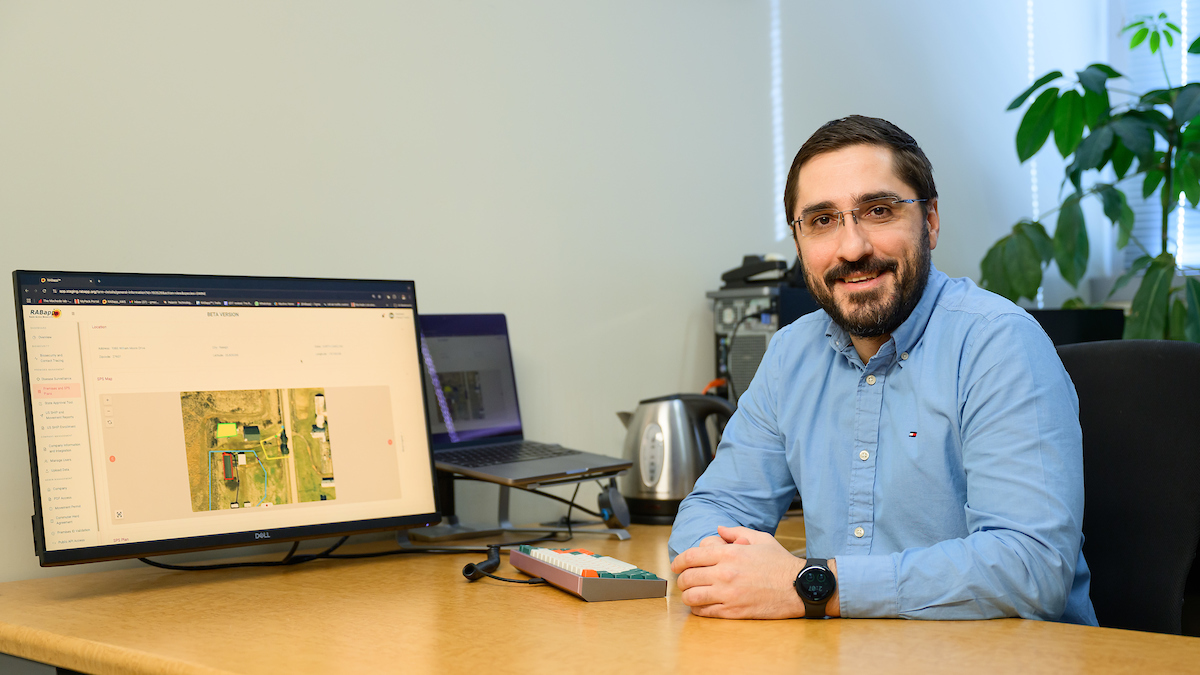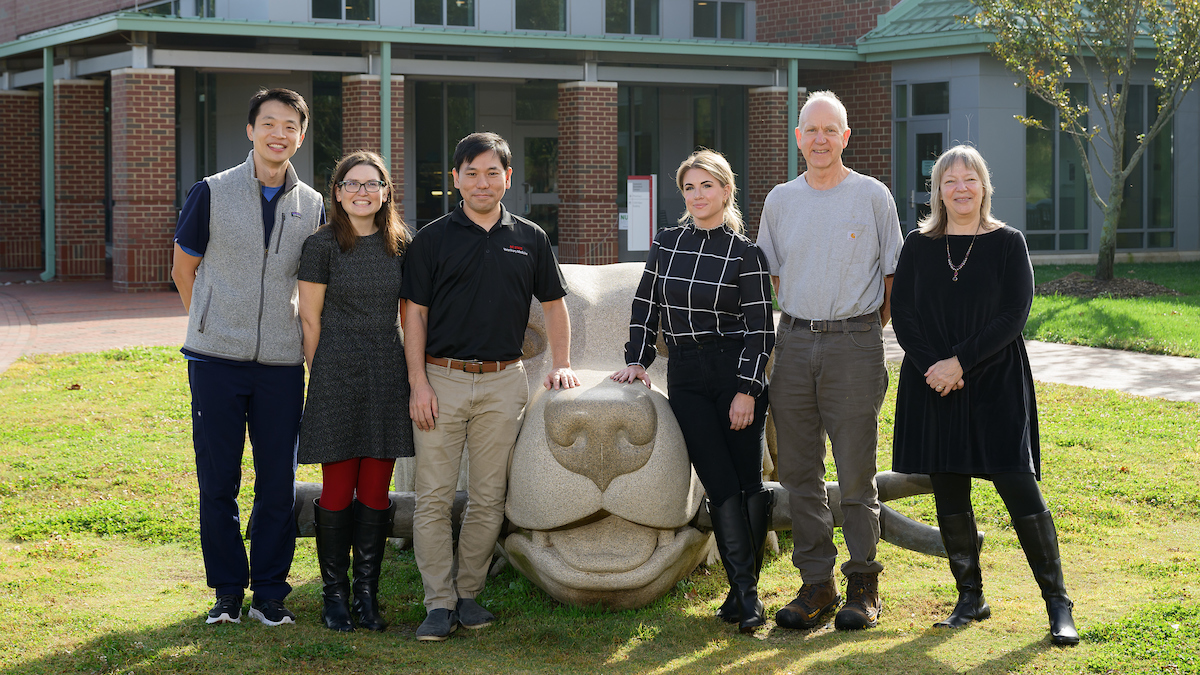Dr. Breen Published in Journal of Chromosome Research
Cancer researchers at North Carolina State University and the University of Minnesota have found that humans and dogs share more than friendship and companionship – they also share the same genetic basis for certain types of cancer. Furthermore, the researchers say that because of the way the genomes have evolved, getting cancer may be inevitable for some humans and dogs.
Dr. Matthew Breen, a professor of genomics with NC State’s College of Veterinary Medicine and Center for Comparative Medicine and Translational Research, and Dr. Jaime Modiano, veterinarian and researcher with the University of Minnesota’s College of Veterinary Medicine and Cancer Center, collaborated on this research study. Their findings are published in the current issue of the journal Chromosome Research, which is a special edition on comparative cytogenetics and genomics research by international scientists.
Genomes are divided into chromosomes, which act as nature’s biological filing cabinets with genes located in specific places.
“Many forms of human cancer are associated with specific alterations to the number or structure of the chromosomes and the genes they contain,” says Dr. Breen, a researcher in the CVM Department of Molecular Biomedical Sciences. “We have developed reagents to show that the same applies to dog cancers and that the specific genome reorganization that occurs in comparable human and canine cancers shares a common basis.”
More specifically, Drs. Breen and Modiano found that the genetic changes that occur in dogs diagnosed with certain cancers of the blood and bone marrow, including chronic myelogenous leukemia (CML), Burkitt’s lymphoma (BL), and chronic lymphocytic leukemia (CLL), are virtually identical to genetic abnormalities in humans diagnosed with the same cancers.
“We believe the implication of this finding is that cancer may be the consequence of generations of genetic evolution that has occurred similarly in dogs and humans,” Dr. Breen says. “This means that to some degree, cancer may be inevitable in some humans and dogs just because of the way our genomes have developed since the separation from a common ancestor.”
Dr. Breen explains further: “We are fortunate to have access to complete genome sequences of human and dog, showing us that our pet dogs are actually quite similar to us in their genetic makeup. A major difference between human and purebred dog populations is the level of genetic variation, which is much lower in purebred dogs. Since we know now that dogs and humans seem to share a common pathogenetic basis for some cancers, we believe that studying dog cancers may allow us to identify cancer-associated genes more easily in dog populations than in human populations. Once identified, we may be able to then translate these findings to human cancers as we seek to provide a greater level of insight into cancer risk, diagnosis and prognosis.”
According to the researchers, dogs are good spontaneous research subjects because many of the modern breeds have developed over the past few hundred years using restricted gene pools. This selected breeding has preserved the genetics of a breed. It has also made some breeds more susceptible to certain cancers. These factors coupled with the high degree of similarity between the genomes of dogs and humans provided the researchers with an opportunity to compare the genomes and study the evolutionary genetic changes associated with cancer.
The human genome has 46 chromosomes and the dog genome contains 78 chromosomes. Genes have a defined place in the chromosomes. However, in the normal duplication process of cells, chromosomes can sometimes become rearranged or relocated. This rearrangement or relocation is called translocation. It can lead to a cell losing its normal function, becoming abnormal, and possibly developing into cancer.
In their study, the researchers compared the chromosomes of humans diagnosed with the three blood and bone marrow cancers to the chromosomes of dogs diagnosed with the same cancers.
“Interestingly, we found that the same translocation of chromosomes happens in dogs as in humans for the three blood and bone marrow cancers we studied,” Dr. Modiano says.
With CML, the researchers found a canine equivalent to the “Philadelphia chromosome”, which results from a translocation between chromosomes 9 and 22 in humans. In dogs, the “Raleigh chromosome” results from a translocation between canine chromosomes 9 and 26, generating a new protein that is analogous to the one produced by the Philadelphia chromosome translocation with portions of the BCR and ABL genes. In BL, the translocation involves chromosomes 18 and 14. And in CLL, chromosome 13 in humans is the same as chromosome 22 in dogs.
The conclusions that Drs. Breen and Modiano say can be drawn from their research are: 1) that despite tens of millions of years of divergence, the evolving genomes of dogs and humans seemed to have retained the mechanism associated with cancer and, 2) the conserved changes in the genomes have similar consequences in dogs and humans.
The researchers say that because all cancers have a genetic component their finding can be used to learn more about the role of genes in causing cancer. Since dog breeds are more homogenous, refined in their genetics, and have common pedigrees, researchers can more quickly determine how dogs get cancer and then use that information in studying cancer in humans.
“Like ourselves, our pet dogs suffer from a wide range of spontaneous cancers,” Dr. Breen says. “For thousands of years humans and dogs have shared a unique bond. In the 21st century this relationship is now strengthened to one with a solid biomedical basis; the genome of the dog may hold the keys to unlocking some of nature’s most intriguing puzzles about cancer.”
The researchers expect to use grants from the National Cancer Institute to start pinpointing risk factors for cancer in various dog breeds.The study was funded with grants from the AKC Canine Health Foundation and the American Cancer Society.


